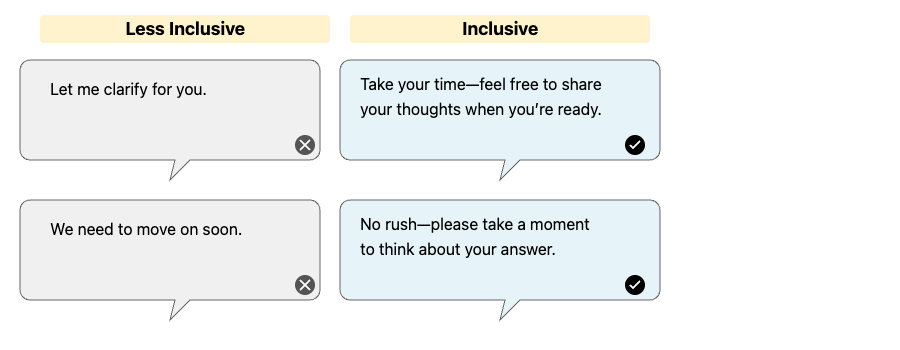Interviews can feel high-pressure for anyone. That’s why it’s so important to create an environment where every candidate feels respected, valued, and able to show their best. Inclusive interviewing is your team’s secret weapon: it not only helps you find great talent, but also builds a stronger, more diverse team.
In this lesson, you’ll learn how to:
- Use inclusive language and behaviors to help every candidate shine since people do their best work when they feel respected and supported.
- Give everyone a fair shot by focusing on job-related questions and equal opportunities, ensuring that your hiring decisions are based on skills and potential, not assumptions.
- Avoid common pitfalls that can introduce bias or make candidates uncomfortable, so you build trust and attract a wider range of talented applicants.
By the end of this lesson, you’ll know how to run interviews that are fair, welcoming, and truly inclusive.
The way you communicate during interviews sets the tone for the whole experience. Inclusive language and a supportive attitude help candidates relax and do their best work. For example, if a candidate seems nervous or stumbles over an answer, avoid jumping in or finishing their thought. Instead of saying, “Let me clarify for you,” try, “Take your time. Feel free to share your thoughts when you’re ready.” This small shift shows respect and helps candidates feel at ease.

Remember, not everyone communicates the same way. Some people are more reserved or need extra time to process questions. By keeping your tone neutral and encouraging, and giving space for thoughtful responses, you help level the playing field for everyone.
Equity in interviews isn’t just about asking the same questions; it’s about making sure everyone has a fair chance to show what they can do. Give each candidate the same amount of time and attention, and don’t make assumptions based on things like accent, education, or work history. If someone is less talkative, you can gently prompt them with, “If you need a moment to think, that’s totally fine,” or ask a follow-up to help them elaborate.
Just as important: steer clear of personal or non-job-related questions. Asking about family, religion, or hobbies can introduce bias and make candidates uncomfortable. Instead of, “Do you have kids?” or “What do you like to do on weekends?”, focus on questions like, “Can you tell me about a time you worked on a challenging project?” If you want to build rapport, try, “What drew you to apply for this role?” This keeps the conversation relevant and inclusive.
Here’s an example of what an inclusive interview conversation can sound like:
- Natalie: Thanks for joining us today, Chris. If you need a moment to think about any question, please feel free to take your time.
- Chris: Thank you, I appreciate that. Sometimes I just need a second to gather my thoughts.
- Natalie: Of course, no rush at all. Let’s start with a job-related question: Can you tell me about a time you worked on a challenging project?
- Chris: Sure, let me think for a moment... Okay, there was a project last year where we had to migrate our backend system.
- Natalie: That sounds interesting. What was your specific role in that migration?
Notice how Natalie uses inclusive language, avoids rushing Chris, and keeps the questions focused on the job. She builds rapport without getting personal, and gives Chris space to respond in his own way.
By using inclusive language, ensuring equal opportunity, and focusing on job-related questions, you help create a fairer, more welcoming process for every candidate. This approach not only helps candidates feel comfortable and respected, but also allows you to better assess their true skills and potential — leading to stronger, more diverse teams. Next, you’ll put these skills into practice in a role-play exercise. You’ll step into the interviewer’s seat, navigate a realistic interview scenario, and build your confidence in running interviews that are truly inclusive and equitable.
